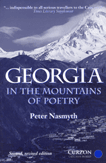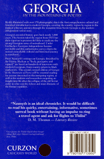Peter Nasmyth in Kutaisi
Peter Nasmyth - a writer, photographer and traveler, born and educated in England visited our town in summer on July 25-27. Peter Nasmyth is also one of the organizers o the first International “Gift” Festival in Tbilisi.


It was not his first visit to Georgia. Over a period of five years he has made numerous trips almost in the whole country and the result f this journey was his famous book “Georgia – A Rebel in the Caucasus” where he gave the description both of the glorious past of the country and the life of the post-Soviet period on the changes during the past times.
It was a pleasant surprise for us to know that the purpose of this visit was to find out the material about the famous English Kartvelologists Marjory and Oliver Wardropes’ activities in Kutaisi at the beginning of the 20th century and to collect some additional material or his new book about Georgia.
Peter Nasmith met the Mayor of Kutaisi, Principal of the Kutaisi State University and Historian Petre Vachridze who spoke about Marjory and Oliver’s life and showed the places where they stayed during their short visits to Kutaisi.
Peter visited the public library and the Kutaisi State Museum to get some additional information about the Wardropes.
During his stay in Kutaisi Peter Nasmyth met the members of the Kutaisi Newport Association and KSU English Speaking Club and presented his book about the Bagrati Cathedral, the Gelati Monastery, the Ruins of Queen Tamar’s Castle, The Home-Museum of the famous Russian poet Vladimir Mayakovsky in Bagdadi. He got acquainted with the life of people in Kutaisi and participated in Georgian wedding party.
We are looking forward to his new book and we wish him success in his future work.
Below are passages from Peter Namyth’s book about Georgias – In the mountains of Poetry.
At the heart of the Caucasus mountains lies one of the most coveted and fought-over countries on earth; the former kingdom of Georgia. Many of Russia’s greatest writers – Pushkin, lermontov, Tolstoy, Gorky – found themselves irresistibly drawn here. The inspiration they discovered caused one famous critic Belinsky, to describe the region as Russia’s ‘poetic homeland’. Today this historic nation struggles through its latest and bloody transition from Soviet to independent state.
***
The Georgians are a fiercely nationalistic people, proud and contradictory. It is a paradoxical land where Christianity’s second oldest culture survives and yet it is the birth-place of Stalin, history’s strongest proponent of atheism.
***
In the afternoon, our bus took us on a brief tour of the northern valley. We raced over to the magnificent eleventh-century Alaverdi Cathedral (at the time under repair), then on up into the deep green hills and, to my mind, the most beautifully set of all Georgia’s churches, the Ikalto Monastery. Surrounded entirely by woods and tall, wistful cypress trees, the tower of the eight-century church rises above the ruins of a former eleventh century Academy, the place rumoured to have enrolled Shota Rustaveli as a student. Now the Academy engaged in earnest Platonic arguments only with the encroaching undergrouth.
Inside the church, on the loose with my camera, it came as no surprise to find a nineteenth-century line-engraving of Rustaveli’s hero knight wrestling with the almighty panther of the poem, It hung on the wall like any other religious icon. During our short visit I caught a tantalizing whiff of what deep spirit of poetry, so admired by the Georgians as race, the culture that used to insist that brides learn chunks of Rustaveli’s poem to recite to their husbands. I could clearly sense here the unique brand of tranquility that would enable a man to sit down and create his epic verse. I felt at Ikalto one could easily spend days in the presences of these lost, imaginary spirits of Gergis, those looked for so longingly by nineteenth-century poets. As Pushkin pleaded nostalgically in an 1828 poem:
I beg you please sing no more,
The songs of Georgia,
For their mournful sounds
Recall for me
A distant life
A distant shore
But not for me on this occasion. The bus summoned me back with a rude blast of its horn. Clambering on board, I found myself greeted by the frosty stares of my companions, who patiently waited for my day-dreaming to end. Then off we flew, like a petrol-fired cannon ball, back to the electronic age.